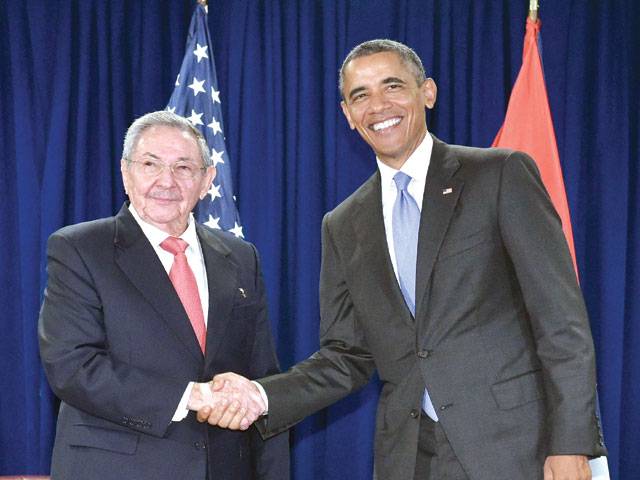UNITED NATIONS - In his first-ever address to the UN General Assembly, Cuban President Raul Castro, noting the warming of diplomatic relations between the US and Cuba, has said that full normalisation of ties will only be achieved with an end to the long-standing US embargo against the Island nation and the cessation of Washington’s “subversion and destabilization programmes,”
Castro also called for compensation for “human and economic damages” resulting from the crippling embargo and the return of Guantanamo Bay Naval Base, which Cuba considers to be illegally occupied by the United States.
Meanwhile, Obama met his Cuban counterpart Raul Castro on Tuesday at the UN. The leaders of the former Cold War rivals shook hands at the start of what was their second meeting, after an historic encounter in April at a summit.
Pledging solidarity with Cuba’s “Caribbean brothers” as well as its other regional neighbours and peoples in conflict in the Middle East, Castro denounced colonialism, imperialist aggression, and foreign interference “in the internal affairs of the States.”
He asserted Cuba’s belief that “full respect for the inalienable right of every State to choose their political, economic, social and cultural system is an essential premise to ensure peaceful coexistence between nations.”
And he pointed out that 70 years after the founding of the United Nations, the world body has not done enough to preserve future generations from the scourge of war, protect human rights, promote social progress and improve standards of living.
Turning to other issues before the Debate, he said climate change is threatening the very existence of the human species, and States should assume common but differentiated responsibility for that, in light of the indisputable reality that not every country is equally accountable, and not all of us waste natural and human resources to an irrational and unsustainable consumerism.
The consequences of climate change have a particularly devastating effect on the small developing island nations and bring additional tension to bear on their fragile economies. And, the same is happening in Africa with the relentless advance of desertification.
Castro delivered his remarks on the opening day of the General Debate on Monday, following a speech to the General Assembly two days prior, on the occasion of the UN’s adoption of the 2030 Agenda for Sustainable Development. It was his first appearance at the United Nations.
After the meeting, the White House said the leaders had discussed the visit last week of Pope Francis, who helped mediate closer US-Cuba ties, to both countries.
And Obama highlighted that, even if the embargo remains, recent US regulatory changes that did not need Congressional approval would allow more Americans to travel and do business in Cuba.
“The president also highlighted steps the United States intends to take to improve ties between the American and Cuban peoples, and reiterated our support for human rights in Cuba,” it said.
“For 50 years, the United States pursued a Cuba policy that failed to improve the lives of the Cuban people,” he admitted, to applause, in his address to fellow world leaders.
“We changed that. We continue to have differences with the Cuban government. We will continue to stand up for human rights.
“But we address these issues through diplomatic relations, and increased commerce, and people-to-people ties.”
Castro, the 84-year-old veteran revolutionary who succeeded his brother Fidel in 2006, made his first address to the Assembly on Monday, a few hours after Obama took the podium.
“Now, a long and complex process begins towards the normalization of relations, but this will only be achieved with the end of the economic, commercial and financial blockade,” he said.
Friday, April 19, 2024
Obama meets Castro as Cuba pushes to end curbs

8:09 AM | April 19, 2024
Hafiz Naeem takes oath as JI chief, announces anti-government movement
11:39 AM | April 19, 2024
Karachi: AVLC hands over snatched, stolen cars to owners
April 19, 2024
Bid to smuggle Siberian cranes foiled, accused held
April 19, 2024
Tajir Dost app: Traders show lack of interest in registration process
11:09 AM | April 19, 2024
Three abducted people rescued in police operation
April 19, 2024
A Tense Neighbourhood
April 19, 2024
Dubai Underwater
April 19, 2024
X Debate Continues
April 19, 2024
Hepatitis Challenge
April 18, 2024
IMF Predictions
April 18, 2024
Kite tragedy
April 19, 2024
Discipline dilemma
April 19, 2024
Urgent plea
April 19, 2024
Justice denied
April 18, 2024
AI dilemmas unveiled
April 18, 2024
ePaper - Nawaiwaqt
Advertisement
Nawaiwaqt Group | Copyright © 2024





